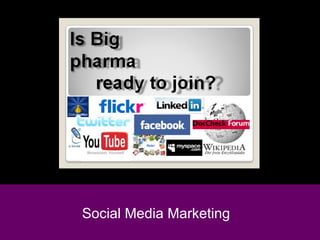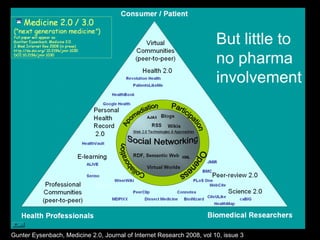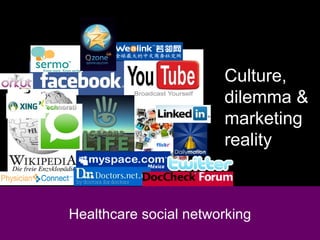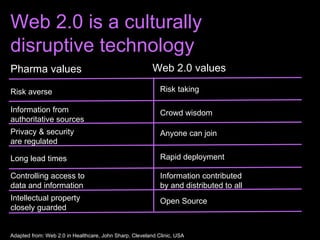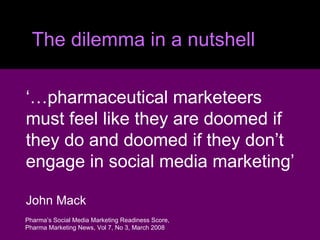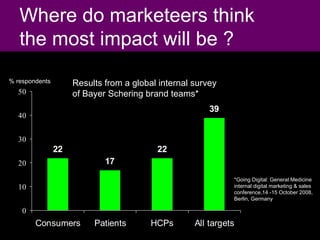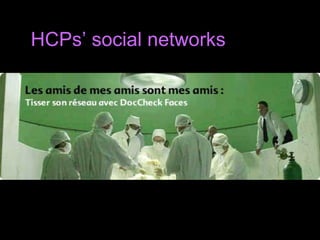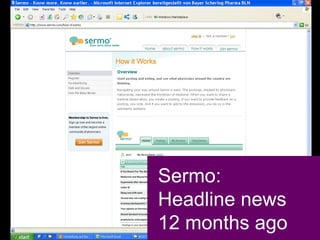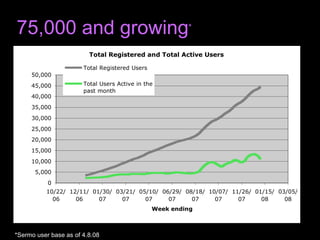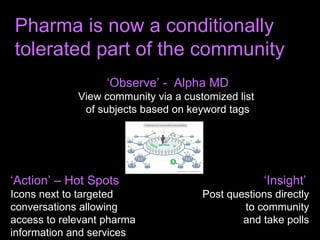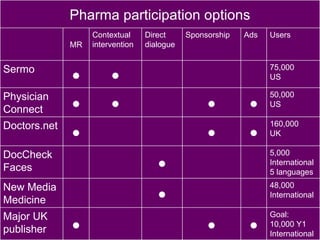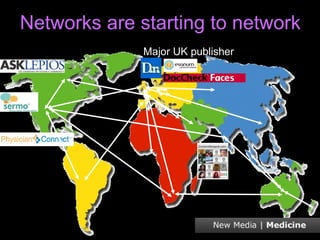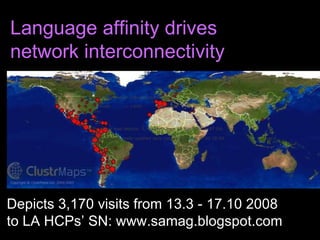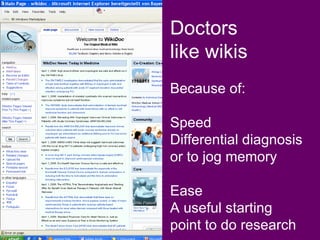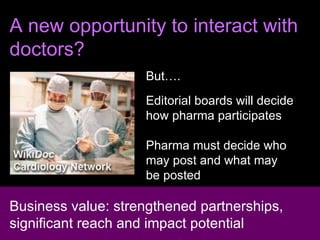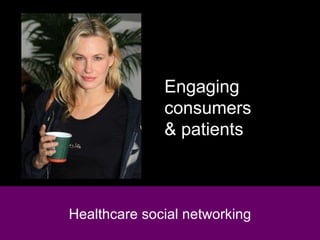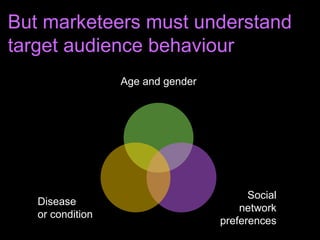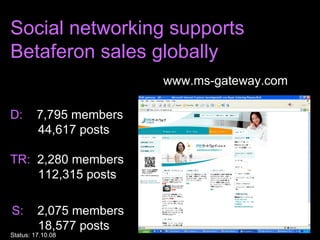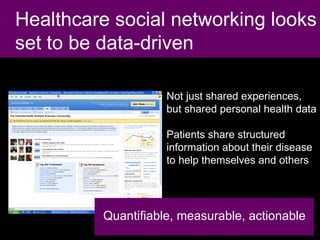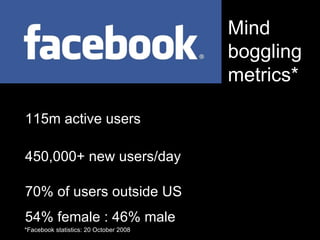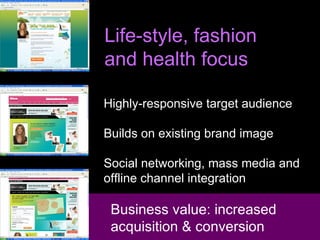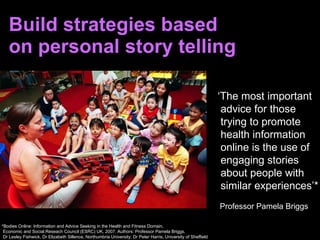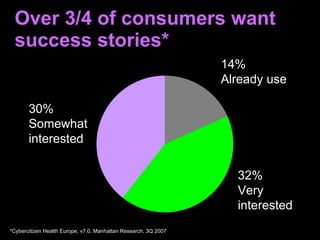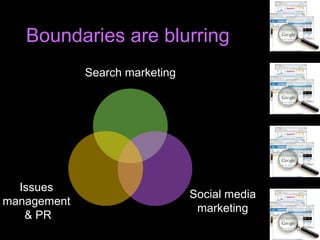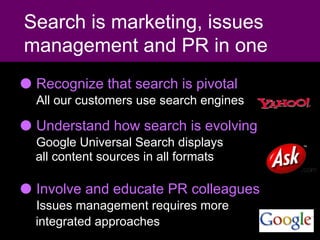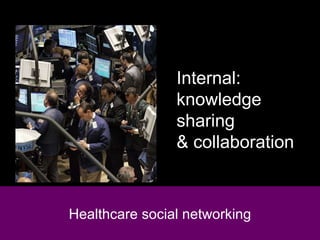Is Pharma Ready
- 2. Context Healthcare & medicine 2.0 Pharma social networking Social networking Participation Apomediation Collaboration Openness
- 3. Gunter Eysenbach, Medicine 2.0, Journal of Internet Research 2008, vol 10, issue 3 But little to no pharma involvement
- 4. Healthcare social networking Culture, dilemma & marketing reality
- 5. Web 2.0 is a culturally disruptive technology Adapted from: Web 2.0 in Healthcare, John Sharp, Cleveland Clinic, USA Pharma values Web 2.0 values Risk averse Information from authoritative sources Privacy & security are regulated Long lead times Controlling access to data and information Intellectual property closely guarded Risk taking Crowd wisdom Anyone can join Rapid deployment Information contributed by and distributed to all Open Source
- 6. The dilemma in a nutshell ŌĆśŌĆ” pharmaceutical marketeers must feel like they are doomed if they do and doomed if they donŌĆÖt engage in social media marketingŌĆÖ John Mack PharmaŌĆÖs Social Media Marketing Readiness Score, Pharma Marketing News, Vol 7, No 3, March 2008
- 7. Social networking Issues management & PR Consumers & patients Sales forces Internal: knowledge sharing & collaboration HCPs Impacts on pharma Search engine marketing
- 8. Relative impact of social networking on pharma 1= very low 10 = very high Currently In 2 years In 4 years Interacting with HCPs 1 3 5 Interacting with consumers & patients 2 4 6 Search engine marketing 1 3 5 Issues management & PR 1 2 3 Sales force effectiveness 1 1 2 Internal knowledge sharing & collaboration 2 4 7
- 9. Where do marketeers think the most impact will be ? % respondents Results from a global internal survey of Bayer Schering brand teams* *Going Digital: General Medicine internal digital marketing & sales conference,14 -15 October 2008, Berlin, Germany
- 10. HCPs Market research Pre and post-launch Consumers & patients Health, disease, condition, & treatment awareness Viral outreach Community building Disease/condition based; some direct dialogue in ex-US markets Brand advertising DTC markets Most used customer- facing strategies worldwide
- 11. Healthcare social networking Interacting with HCPs
- 13. Sermo: Headline news 12 months ago
- 14. 75,000 and growing * *Sermo user base as of 4.8.08
- 15. Sermo members markedly older than average internet Age of Sermo users Percent total
- 16. Pharma is now a conditionally tolerated part of the community ŌĆś ObserveŌĆÖ - Alpha MD View community via a customized list of subjects based on keyword tags ŌĆś InsightŌĆÖ Post questions directly to community and take polls ŌĆś ActionŌĆÖ ŌĆō Hot Spots Icons next to targeted conversations allowing access to relevant pharma information and services
- 17. Unique ability to monitor opinion and trends in speciality communities Conduct ad hoc real-time market research Enhanced ability to influence prescribers Relevant information targeted at a receptive audience at the right time in the right context SermoŌĆÖs added value
- 18. ╠²
- 19. Network proliferation USA Sermo (75,000) Physician Connect (50,000) Student Doctor Network Healtheva Relaxdoc SocialMD Sosido (HC associations) Clinical Village MedicSpeak Canada Asklepios DoctorNetworking Europe Doctors.net.uk (160,000) DocCheck Faces (5,000) Esanum (23,000) Coliquio OnMedica International New Media Medicine (48,000) DoctorsHangout.com (6,000) Doctor.VG Tiromed Major UK publisher (launching Nov/Dec 08)
- 20. Pharma participation options MR Contextual intervention Direct dialogue Sponsorship Ads Users Sermo ŌŚÅ ŌŚÅ 75,000 US Physician Connect ŌŚÅ ŌŚÅ ŌŚÅ ŌŚÅ 50,000 US Doctors.net ŌŚÅ ŌŚÅ ŌŚÅ 160,000 UK DocCheck Faces ŌŚÅ 5,000 International 5 languages New Media Medicine ŌŚÅ 48,000 International Major UK publisher ŌŚÅ ŌŚÅ ŌŚÅ Goal: 10,000 Y1 International
- 21. Major UK publisher Networks are starting to network
- 22. Depicts 3,170 visits from 13.3 - 17.10 2008 to LA HCPsŌĆÖ SN: www.samag.blogspot.com Language affinity drives network interconnectivity ╠² ╠²╠² distance in which individuals are clustered Dot sizes:╠²╠² ╠² ╠²╠²╠² = 1,000+ ╠²╠² ╠²╠²╠² = 100 - 999 ╠²╠² ╠² ╠² = 10 - 99 ╠²╠² ╠² = 1 - 9 visits The above map depicts: 3,170 visits from 13 Mar 2008 to 17 Oct 2008 This map is normally updated daily (latest: 2008-10-17 03:38:59 GMT)
- 23. ŌĆś May be the answer to the worldŌĆÖs inequalities of information access in medicineŌĆ”ŌĆÖ* The rise and rise of medical wikis *Dean Giustini, How Web 2.0 is Changing Medicine, BMJ, 23 December 2006
- 24. ŌĆś The Medpedia project is an extraordinary global effort to collect, organize and make understandable, the worldŌĆÖs best information about health, medicine and the bodyŌĆ”ŌĆÖ* ŌĆ” and soon Medpedia *www.medpedia.com Novo Nordisk
- 25. Doctors like wikis Because of: Speed Differential diagnosis or to jog memory Ease A useful starting point to do research *Jessica Berthold, Web Watch: Living in a Brave New World of Medical Wikis, American College of Physicians, 2008 www.acponline.org
- 26. A new opportunity to interact with doctors? ButŌĆ”. Editorial boards will decide how pharma participates Pharma must decide who may post and what may be posted Business value: strengthened partnerships, significant reach and impact potential
- 27. Healthcare social networking Engaging consumers & patients
- 28. Social networks influence patientsŌĆÖ treatment decisions* Ages: 35 - 44 53% Strong + some impact 47% No impact + donŌĆÖt know *Adapted from : Pharma 2.0. A How-To Guide to Consumer-Generated Content. ePharma Consumer v7.0, Manhattan Research 2008
- 29. But marketeers must understand target audience behaviour Age and gender Social network preferences Disease or condition
- 30. Social networking supports Betaferon sales globally www.ms-gateway.com D: 7,795 members 44,617 posts TR: 2,280 members 112,315 posts S: 2,075 members 18,577 posts Status: 17.10.08
- 31. 10 years of community management experience Restricting conversations is fatal Be open, honest and responsive Set clear community management policies Significant local resources needed Business value: increased trust & loyalty
- 32. Healthcare social networking looks set to be data-driven Not just shared experiences, but shared personal health data Patients share structured information about their disease to help themselves and others Quantifiable, measurable, actionable
- 33. Disease networks will look and be radically different Data provided by 1056 Betaseron patients ŌĆś People who use it will live longer; people who donŌĆÖt wonŌĆÖtŌĆÖ Jamie Heywood Co-founder, Patientslikeme
- 34. Social networking drives YAZ sales in the USA* Veronicas partnership TV ads Facebook MySpace YouTube Blogs Emails Viral outreach Video contest *Stefan Oelrich, VP WomenŌĆÖs Health, BHC USA 9 million impressions 350,000 song streams
- 35. *Manhattan Research, ePharma Consumer, v7.0, no 11, 2008 % women searching for online health information who visit Facebook Age group Women 18-24 are most likely to use Facebook
- 36. Acne ADD/ADHD) adult Ear infections Eye infections Migraine Bipolar disorder Anxiety/social phobia Infertility Asthma Allergies Top conditions which Facebook users search for* *Manhattan Research, ePharma Consumer, v7.0, no 11, 2008
- 37. 115m active users 450,000+ new users/day 70% of users outside US 54% female : 46% male Mind boggling metrics* *Facebook statistics: 20 October 2008
- 38. Life-style, fashion and health focus Highly-responsive target audience Builds on existing brand image Social networking, mass media and offline channel integration Business value: increased acquisition & conversion
- 39. Build strategies based on personal story telling *Bodies Online: Information and Advice Seeking in the Health and Fitness Domain, Economic and Social Reseach Council (ESRC) UK, 2007. Authors: Professor Pamela Briggs, Dr Lesley Fishwick, Dr Elizabeth Sillence, Northumbria University; Dr Peter Harris, University of Sheffield ŌĆś The most important advice for those trying to promote health information online is the use of engaging stories about people with similar experiencesŌĆÖ* Professor Pamela Briggs
- 40. Over 3/4 of consumers want success stories* *Cybercitizen Health Europe, v7.0, Manhattan Research, 3Q 2007 14% Already use 32% Very interested 30% Somewhat interested
- 41. Healthcare social networking Search marketing Issues management & PR
- 42. Boundaries are blurring Search marketing Social media marketing Issues management & PR
- 43. Social networking spaces increasingly visible on search results* Cholesterol category Pravastin: 6% blog share 50% growth 06 ŌĆō 08* Posts often unfavourable* * Web 2.0 Influence for Pharma Brands on the Rise, vFluence, 8.4.08. www.v-fluence.com Search for brands, land on blogs & wikis
- 44. Recognize that search is pivotal All our customers use search engines Understand how search is evolving Google Universal Search displays all content sources in all formats Involve and educate PR colleagues Issues management requires more integrated approaches Search is marketing, issues management and PR in one
- 45. Should we use corporate blogs to get back into the conversation? J&J blogger Marc Monseau
- 46. But is it really social networking? ŌĆś Part of social networking is the ability of ordinary people like you and me - JNJ customers - to add comments to social networks set up by others. Usually when pharmaceutical companies host a social network channel, they turn off the comments for obvious and understandable reasonsŌĆÖ Fair question from John Mack
- 47. Healthcare social networking Internal: knowledge sharing & collaboration
- 48. Internal usage leads *How Businesses are Using Web 2.0, The McKinsey Quarterly 2007. Responses from 2847 executives in retail, high tech, telcoms, financial and pharma sectors How are web 2.0 technologies currently being used?* % positive respondents
- 49. More of a cultural issue Enterprise 2.0 Not just a technology issue Do we incentivize knowledge sharing? Are social media tools used ŌĆśin or above the flowŌĆÖ? Are we aware of the potential of ŌĆścognitive surplusŌĆÖ?
- 50. Wikis can streamline project management Wiki pilot for a BSP key opinion leader management project Wikis capture unstructured and anecdotal information that would otherwise be lost

